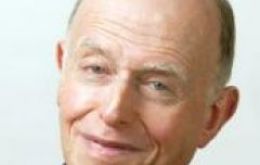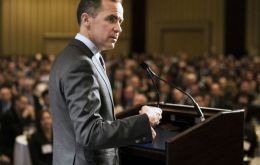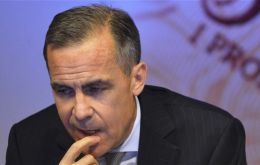MercoPress. South Atlantic News Agency
Tag: Bank of England
-
Friday, May 9th 2014 - 22:15 UTC
Bank of England leaves rates unchanged as UK economy recovers

Interest rates have been held at the record low of 0.5% for another month by the Bank of England and so has the size of its bond-buying economic stimulus program unchanged at £375bn.The news is in line with analysts' expectations, despite recent evidence that the UK economic recovery is strengthening.
-
Tuesday, April 29th 2014 - 06:00 UTC
The Houblon £50 notes 20-year cycle ends next Wednesday says BoE

The £50 note featuring the first governor of the Bank of England, Sir John Houblon, will be withdrawn on Wednesday after 20 years in circulation. From that time, only the £50 banknote featuring Matthew Boulton and James Watt, which was introduced in 2011, will hold legal tender status.
-
Thursday, April 17th 2014 - 04:53 UTC
For third consecutive month UK inflation stands below the 2% target rate

The UK inflation rate as measured by the Consumer Prices Index (CPI) fell to 1.6% in March from 1.7% in February, according to the Office for National Statistics (ONS). It is the third consecutive month inflation has been below the Bank of England's 2% target rate, and the lowest rate since October 2009.
-
Friday, April 11th 2014 - 04:22 UTC
Bank of England leaves interest rates unchanged as UK recovery picks up

UK interest rates have been held at their record low of 0.5% for another month by the Bank of England. On Thursday the Bank also kept the size of its bond-buying stimulus program unaltered at £375bn. No changes had been expected to either rates or the bond-buying measure, despite recent evidence that the UK economy is continuing to recover.
-
Friday, March 28th 2014 - 06:45 UTC
London becomes hub for Chinese currency dealings and clearing

The Bank of England has agreed a deal with the People's Bank of China to make London a hub for Chinese currency dealing. The memorandum of understanding, to be signed next Monday, sets out settlement and clearing arrangements for the Renminbi, or Yuan, in London.
-
Tuesday, March 18th 2014 - 22:15 UTC
Carney begins implementation of 'root-and-branch' review in Bank of England

Two new deputy governors have been named at the Bank of England, as part of a radical shake-up by governor Mark Carney. Ben Broadbent will become deputy governor responsible for monetary policy, and Nemat Shafik will take charge of markets and banking.
-
Thursday, March 6th 2014 - 21:13 UTC
UK interest rate held at 0.5%, making it a record low of five years

UK interest rates have been held at 0.5% for another month, the Bank of England announced on Thursday. The decision by the Bank's Monetary Policy Committee comes five years after the record low level was first introduced.
-
Friday, February 21st 2014 - 07:30 UTC
Chancellor Osborne warns UK recovery 'is not yet secure' despite recent growth surge

UK Chancellor George Osborne said next month’s Budget will continue to confront Britain’s problems as he cautioned the recovery was “not yet secure” despite a recent surge in growth.
-
Saturday, December 14th 2013 - 06:26 UTC
Bank of England concerned about potential for a UK housing market bubble

Bank of England governor Mark Carney has said he is concerned about the “potential” for a UK housing market bubble, but will tighten lending requirements if necessary. Meanwhile, a survey suggested house prices will continue “surging ahead”.
-
Friday, December 6th 2013 - 23:31 UTC
Despite strong signs of recovery, Bank of England leaves interest rates unchanged

The Bank of England held interest rates at a record low once more this week in spite of mounting optimism over the UK recovery. A flurry of encouraging signs on the UK economy has fuelled expectations for growth to pick up to around 1% this quarter.
